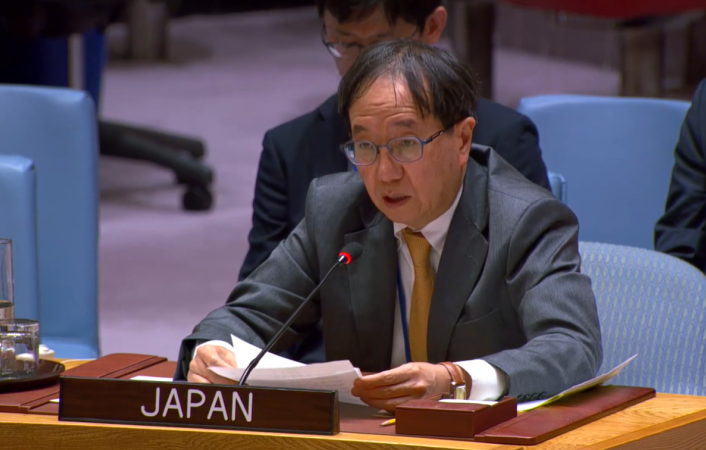Statement by H.E. Ambassador YAMAZAKI Kazuyuki, Permanent Representative of Japan to the United Nations, at the Security Council Open Debate on Poverty, Underdevelopment and Conflict: Implications for the Maintenance of International Peace and Security
2025/6/19

(As delivered)
Thank you, Madam President.
I thank the Co-operative Republic of Guyana for convening this important high-level open debate.
With only five years remaining to achieve the 2030 Agenda and at time where the world faces increasingly complex and interconnected challenges, this meeting is indeed timely and highly relevant. Japan welcomes this initiative, and would like to highlight three key points.
First, the interlinkages between poverty, underdevelopment, and conflict require a comprehensive and context-specific approach that reflects the concept of human security, as promoted through the Humanitarian-Development-Peace nexus. In order to achieve both sustaining peace and sustainable development, it is critical to strengthen synergies among humanitarian, development, and peace actors through the human-security perspective. As one of the examples, I wish to mention that the Japan International Cooperation Agency (JICA) is collaborating with UNHCR in Uganda, providing training on rice cultivation techniques aimed at improving the livelihoods of both host communities and refugees. This collaboration between development and humanitarian actors also contributes to peace and stability in Uganda and the region, thereby reinforcing human security.
Second, addressing poverty and underdevelopment contributes to conflict prevention, and thereby assists in the promotion of sustaining peace. In this regard, Japan welcomes and supports development and preventive efforts, such as the initiative in Sierra Leone implemented by the UN Country Team through the Peacebuilding Fund, which was completed in 2024. Conflict prevention approaches, including early warning mechanisms to detect potential conflict at an early stage, can be cost-effective, given the political, social, and economic costs of full-scale conflict.
Third, Japan stresses the importance of strengthening coordination both within and beyond United Nations bodies. In the face of complex and multiplying global crises, a whole of UN approach, anchored in closer collaboration among the Security Council, the General Assembly, and ECOSOC, is more essential than ever and the Peacebuilding Commission (PBC) is uniquely positioned to bridge these organs. As the informal coordinator between the PBC and the General Assembly, Japan is committed to further strengthening cooperation between these two bodies. Building on the expertise the PBC has accumulated over the years, Japan also proposes the Security Council to further leverage the PBC’s advisory and bridging functions. Furthermore, the PBC can serve as a platform for engagement not only with UN entities but also with International Financial Institutions.
Madam President,
To conclude, Japan reaffirms its strong belief that sustainable, resilient, and inclusive development, grounded in the concept of human security, is fundamental to addressing the root causes of conflict and achieving lasting peace. We remain fully committed to achieving sustaining peace and sustainable development.
I thank you.
I thank the Co-operative Republic of Guyana for convening this important high-level open debate.
With only five years remaining to achieve the 2030 Agenda and at time where the world faces increasingly complex and interconnected challenges, this meeting is indeed timely and highly relevant. Japan welcomes this initiative, and would like to highlight three key points.
First, the interlinkages between poverty, underdevelopment, and conflict require a comprehensive and context-specific approach that reflects the concept of human security, as promoted through the Humanitarian-Development-Peace nexus. In order to achieve both sustaining peace and sustainable development, it is critical to strengthen synergies among humanitarian, development, and peace actors through the human-security perspective. As one of the examples, I wish to mention that the Japan International Cooperation Agency (JICA) is collaborating with UNHCR in Uganda, providing training on rice cultivation techniques aimed at improving the livelihoods of both host communities and refugees. This collaboration between development and humanitarian actors also contributes to peace and stability in Uganda and the region, thereby reinforcing human security.
Second, addressing poverty and underdevelopment contributes to conflict prevention, and thereby assists in the promotion of sustaining peace. In this regard, Japan welcomes and supports development and preventive efforts, such as the initiative in Sierra Leone implemented by the UN Country Team through the Peacebuilding Fund, which was completed in 2024. Conflict prevention approaches, including early warning mechanisms to detect potential conflict at an early stage, can be cost-effective, given the political, social, and economic costs of full-scale conflict.
Third, Japan stresses the importance of strengthening coordination both within and beyond United Nations bodies. In the face of complex and multiplying global crises, a whole of UN approach, anchored in closer collaboration among the Security Council, the General Assembly, and ECOSOC, is more essential than ever and the Peacebuilding Commission (PBC) is uniquely positioned to bridge these organs. As the informal coordinator between the PBC and the General Assembly, Japan is committed to further strengthening cooperation between these two bodies. Building on the expertise the PBC has accumulated over the years, Japan also proposes the Security Council to further leverage the PBC’s advisory and bridging functions. Furthermore, the PBC can serve as a platform for engagement not only with UN entities but also with International Financial Institutions.
Madam President,
To conclude, Japan reaffirms its strong belief that sustainable, resilient, and inclusive development, grounded in the concept of human security, is fundamental to addressing the root causes of conflict and achieving lasting peace. We remain fully committed to achieving sustaining peace and sustainable development.
I thank you.
